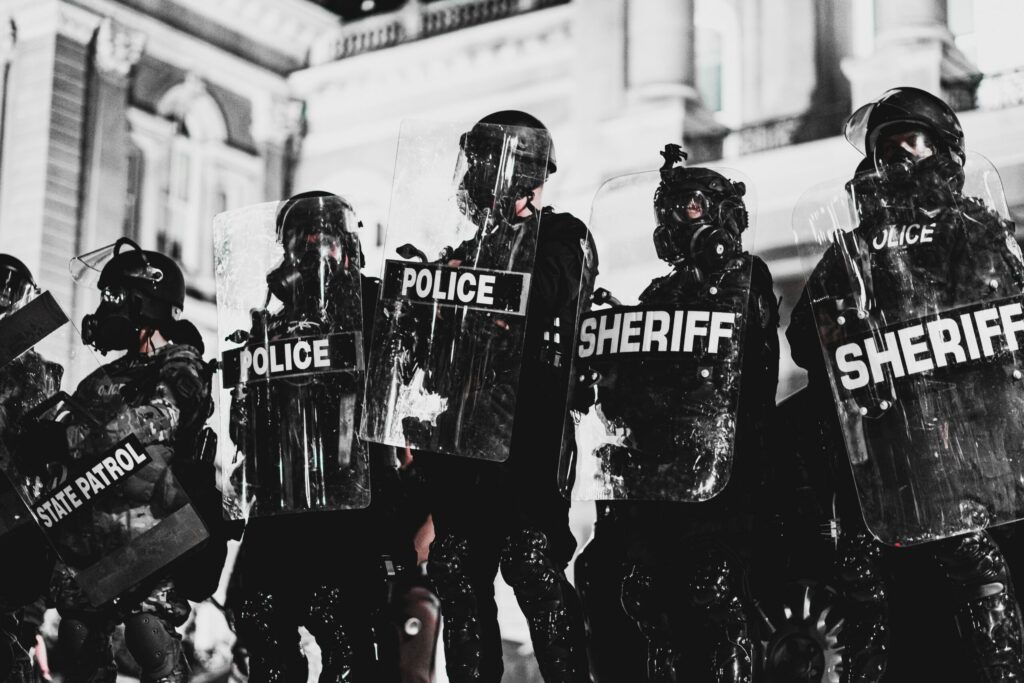A few days ago my husband glanced up from his computer and noticed an open garage door down the street. Our neighbor, a Denver police officer, was dressed in black riot gear and heading for his car.

We walked outside to talk to him before he left for another sixteen-hour shift downtown, where hundreds of protesters have gathered daily in the wake of the killing of George Floyd.
Like his fellow officers, our neighbor is horrified by Floyd\’s murder. He was quick to point out that the vast majority of protesters are peaceful…until night falls. Darkness, physical and spiritual, draws the looters, the anarchists, and the violent.
Our neighbor is a committed Christian with a lovely family, and he appreciated our promise to pray for him and these difficult circumstances.
Praying When Words Fail
Some prayers come easily. I know how to pray for safety—for protesters, for cops, for shop owners. I know how to pray, in the words of the Great Litany, “for that which is good and beneficial for our souls, and for peace for the world.”
Beyond this, my mind, my heart, and my lips fall silent. The grief, the outrage, the suffering across the United States is palpable. I simply do not know what to pray in this season.
And yet, the Church has given us a treasure in one simple prayer that encompasses all need, spoken and unspoken:
“Lord Jesus Christ, Son of God, have mercy on me, a sinner.”
Or, more simply, “Lord Jesus Christ, have mercy on me.”

Peace, healing, justice—this simple plea for mercy encompasses all of these needs and more.
It is easy to lose sight of the power of God’s mercy. During the Divine Liturgy, our congregational response, “Lord, have mercy!” can become rote because of its frequent repetition. Also, we who live in the West can miss the deep meaning of this prayer because mercy has such a strong juridical connotation in English. We throw ourselves upon the court’s mercy, and the condemned man pleads for mercy in the form of pardon from the judge. We think of mercy as a withholding of judgment. It is not a gift received so much as the relief of not getting the punishment we deserve.
In his book Let Us Attend, Fr. Lawrence Farley notes that in the Greek, mercy (eleison) has a wider meaning. It includes pardon but also “blessing, strength, rescue, the total outpouring of God’s generosity.” The Hebrew equivalent, hesed, is translated as “mercy” in the Old Testament but also “steadfast love” and “lovingkindness.”
In other words, mercy is everything we need in this moment. In every moment.
When we ask God for His mercy—for ourselves, for our nation, for bereaved families—we ask Him to pour out His love in answer to all of our prayers:

The word mercy in English is the translation of the Greek word eleos, and it has the same ultimate root as the old Greek word for oil, or more precisely, olive oil, a substance that was used extensively as a soothing agent for bruises and minor wounds. The oil was poured onto the wound and gently massaged in, thus soothing, comforting, and making whole the injured part (see the the parable of the Good Samaritan, Luke 10:33).… The Greek words for “Lord, have mercy” are Kyrie eleison—that is to say, “Lord, soothe me, comfort me, take away my pain, show me Your steadfast love and Your compassion.” –Benjamin D. Williams and Harold B. Anstall, Orthodox Worship, p. 124
Williams and Anstall continue, “God is love: God is all-compassionate, all-knowing, and all-understanding. The pleas for mercy, therefore are asking God merely to be Himself to us and to lift us up—who are fashioned in His image—that we may come to know Him and to do His will” (p. 135).
When I have no words adequate for the magnitude of the grief, I can trust in this outpouring of God’s blessing. I ask for God’s mercy on our nation. I ask for His mercy on people of color who experience suspicion, prejudice, and injustice on a daily basis. I ask for His mercy on the soul of George Floyd and on his grieving family. I ask for His mercy on me, that I may be a vessel of the lovingkindness that He pours out so generously on all of us.
And, yes, I ask for God’s mercy on the police officer who used his power to kill rather than to protect and defend. Like the murderers King David and the Apostle Paul, may he find repentance and mercy.
Lord Jesus Christ, have mercy on us.
Thank you for this complete reminder of how mercy, a word we say so often that it can be taken for granted, truly has such depth to its meaning & impact on our lives.
Amen. Amen
Please correct the name in the first paragraph under the photo from Floyd George to George Floyd — thank you!
Done. Ohmygosh, I can’t believe I reversed his name. Thanks for the correction!
Thank you so much for this blog post! I was familiar with the word for “mercy” in Greek being the root for olive oil, however, I have not seen the description stated so well as you cite from this book — thank you!